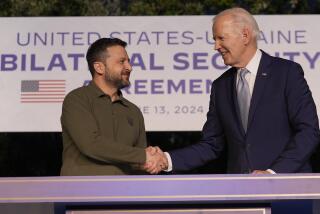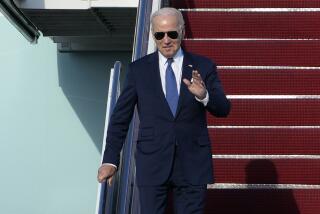Toward a Grand Settlement--Now : Europe: America cannot and should not be the chief architect of a new security system for the Continent, but it must do more than react.
After 45 years, the opportunity is now at hand to write a peace treaty to bring World War II to an end.
The Warsaw Pact has collapsed. Mikhail Gorbachev has given a clear signal to the regimes of Eastern Europe that Soviet tanks will not save them. The collapse of communist rule throughout the Soviet European security shield, so long feared in the West as the spark that could start World War III, has finally prompted the United States to downgrade the military threat in Europe.
This extraordinary moment makes a political settlement in Europe both possible and urgent.
President Bush has been attacked for the limp rhetoric with which he has greeted mamy of the changes in Eastern Europe. What is needed, however, is not grandstanding at the Brandenburg Gate. It is a set of clearly articulated U.S. goals and strategies for a world undergoing dizzying transformation. Administration officials fear that an active rather than a reactive foreign policy increases the risk of costly mistakes. But the failure to push a new security arrangement in Europe when one is so clearly needed is much more risky.
The unprecedented conjunction of forces and events offers not only the chance to write an end to a long, sad chapter of human history; it also imposes an obligation to put into place the pillars of a new international system to take the place of the one created by American initiatives 40 years ago. The changes are so great and they are coming so fast that nothing short of the grand settlement envisaged by Winston Churchill in the 1950s offers the hope of a stable security arrangement.
Unlike the 1940s situation, the United States is not in control of the action. Two weeks ago the European Community held a summit to plan reactions to the drama unfolding in Eastern Europe. Gorbachev is busily establishing new relationships with the other players in the West, and it should not be assumed that these relationships depend on his personal survival. This country cannot and should not be the chief architect of the new European security system, but it must do more than react.
The United States, like all the other players, is unprepared. There are file drawers of contingency plans in the Pentagon for fighting all sorts of wars that can never be fought, but the White House clearly had no contingency plans for a Cold War victory.
Suddenly there is talk of cutting more than $180 billion from the defense budget over the next few years and accelerating the pace of troop reductions in Europe. But there are no plans for easing the conversion of military production to peaceful purposes, or for using a desperately needed peace dividend to address the underlying causes of America’s deepening domestic problems. It has been more than a year since George Bush was elected, but his Bush Administration has not yet articulated either a set of post-Cold War goals or a strategy for achieving them. In the grip of unshakable Cold War assumptions about the limits of change under communism, the Administration has been displaying astonishment and calling it prudence.
The German Problem is now ripe for solution. But the only one that can work is to encourage a political process leading to greater German unity within a progressively more united Europe. The United States can neither prevent reunification nor orchestrate the range of possible new relationships between the Germanys. But it can put its authority as a World War II victor and its still-considerable weight in world affairs behind flexible security plans that will give the two Germanys time to evolve a new relationship without precipitating severe economic crisis.
The great contribution the United States can make is to push much faster for a radical reduction of military forces across the Continent. Peace can be built only on a NATO-Warsaw Pact consensus that, for the first time in 55 years, Europe faces no danger of war. Especially now, none of the nations on either side of the line can afford the charade of endless, mindless war preparation.
This is not the time for grudging cutbacks in the military budget but for fundamental rethinking concerning the goals and missions of U.S. military forces in a world where the threat of war in Europe is no longer credible and the costly maintenance of military forces to fight communism around the world, most of which we dare not use, has become the modern day Maginot Line.
More to Read
Get the L.A. Times Politics newsletter
Deeply reported insights into legislation, politics and policy from Sacramento, Washington and beyond. In your inbox three times per week.
You may occasionally receive promotional content from the Los Angeles Times.










